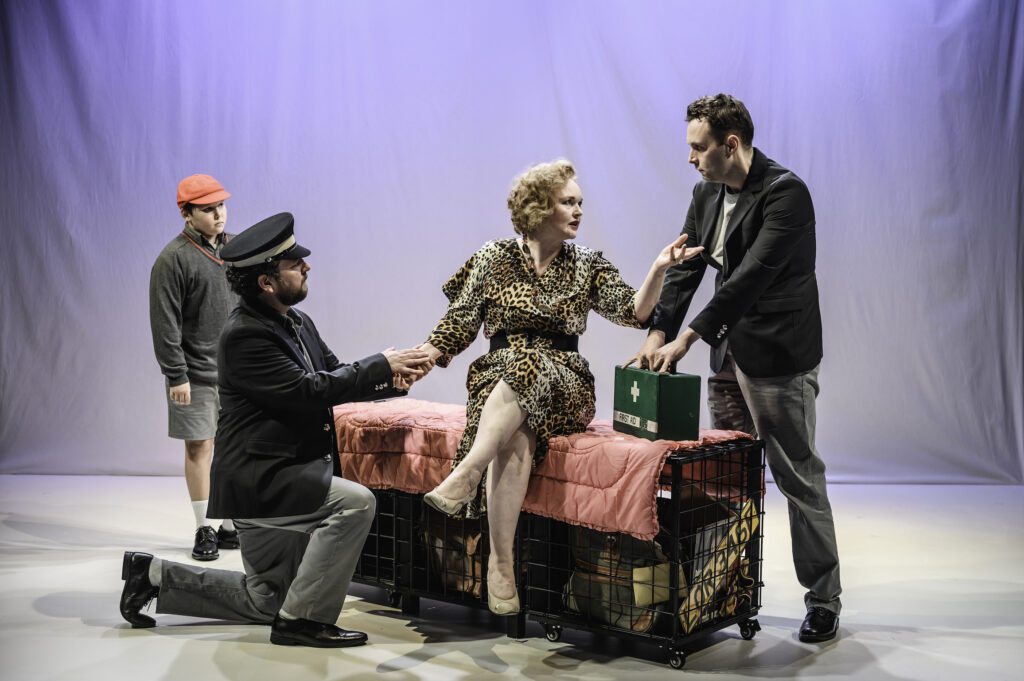
Review by Katie Shaw
Walking into the King’s Head Theatre in Islington on Monday evening, I was unsure what to expect. There was a buzz in the air, purple flashing lights in the stairwell, and anticipation for Jonathan Maitland’s How To Survive Your Mother, a play based on his memoir of the same name, first released in 2006. Maitland appears on stage as himself, remarking to the audience, ‘I am not an actor, I am a playwright.’
He is joined by the other two versions of himself: younger Jonny, played by the delightful Howard Webb, and adult Jonny, characterised by the brilliant Peter Clements. Emma Davies is captivating as Berouia (all the vowels) ‘Bru’ Maitland, the Mother, commanding the stage in her alluring leopard print dress and silver kitten heels, fluffing her hair and admiring herself in the imagined mirror. Davies was witty, humourous, glamorous, deceptive, and evil as the Mother, and equal parts empathetic, sincere and gentle as Maitland’s wife.
John Wark and Stephen Ventura portray several minor characters who exist in Bru’s orbit, bringing an amusing and convincing dynamic to each of their characters. Wark also portrays Ivor, Maitland’s father, a seemingly passive and distant father who we come to learn had more to do with Bru’s deceptive behaviour than we – and Jonny – first thought, adding a degree of complexity and tension to Maitland’s relationship with him. With scenes oscillating between young and adult Jonny and his mother, and present-day Maitland with Davies playing his wife and therapist, Maitland pieces together his recollections of his mother and their relationship.

As a young boy, Maitland’s mother ran a corrupt old people’s home where she lived deliciously delusionally. She hides her true Jewish identity from society – instead pretending to be half-French, half-Spanish – and constantly craves attention. At one point, she faked dying, but once the two male paramedics arrived she was right as rain, chatting and flirting away with them. This seemed to be her ruse – whenever Jonny became suspicious of his mother’s intentions, she would claim she was dying, with 6 months to live.
Perhaps inevitably, Maitland’s father grew tired of this behaviour, and the Mother divorced him. She gloats about becoming famous for successfully divorcing him and quickly remarries the private investigator who helped her obtain this divorce. The men never stick around for too long, and at one point it is suggested that the Mother was only ever seeking the love of a man – although ultimately, her vanity comes before anything else, including her family and loved ones.
It is clear that young Jonny is utterly oblivious to his mother’s – as he describes it – madness. He’s barely able to get a word in, as his mother floats around him, swearing and flirting frivolously, sending him off to boarding school aged 3 and forgetting to pick him up when term ends. Because of the Mother’s dramatised charm and natural allure, young Jonny seems to shrug off this behaviour. The veil lifts as an adult, where Jonny is more angry towards his mother for her constant trail of lies and erratic behaviour. Maitland’s recollections help us to see why: his mother opens a gay hotel, aptly named Hotel Homo Lulu, seemingly to piss off her conservative neighbours. As a young adult, Jonny once came home to his mother claiming she had cancer of the eyebrow, to hide the fact she had had a facelift.

Interestingly, Maitland – the playwright, not an actor – admits that he came to vaguely understand his mother and her mad behaviour more once he became a father himself. The penultimate scene sees the three versions of Jonny stand on stage, where Maitland asks the younger two if they are ok. They agree that, in spite of their upbringing, they are ok, although it is clear that Maitland is confronting some wounds from his childhood.
Whilst I was engaged throughout, and the performances were good, there was something missing that didn’t quite have me hooked. The sentiment of the play was well intended, but there was a depth missing – certain serious topics were brushed over, and I felt that some themes could and should have been explored in greater depth. While it was, at times, an entertaining and bold play, it didn’t quite hit the mark for me – whatever that mark may be.
Rating: ★★★☆☆ (Good)
How to Survive Your Mother is at King’s Head Theatre, London, until 24 November














